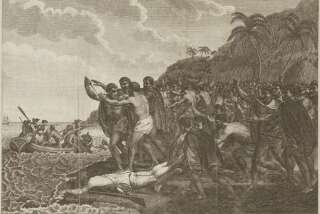THE FATAL SHORE by Robert Hughes(Vintage...
- Share via
THE FATAL SHORE by Robert Hughes(Vintage Books: $10.95) A dazzling, encyclopedic chronicle of the first 80 years of England’s colonization of the Australian continent, from the first convict fleet’s arrival in Botany Bay in 1788 to the last, in 1868. Relying on countless documents, including the diaries and letters of both convicts and their jailers, Robert Hughes provides a virtual blow-by-blow account of one of the most brutal periods in modern history: when men and women, convicted of no greater crime than, say, petty theft, were rounded up (along with other more hard-core criminals) and shipped thousands of miles across the oceans, to be subjected to constant floggings, starvation, virulent contagions and daily ritualized degradations of every imaginable spirit-breaking kind. Hughes’ descriptions of sadism and suffering, desperate escape attempts, rape, murder, cannibalism, and forays into the bush to exterminate the aboriginal and other indigenous peoples, become, in their accumulation, wearying, mind-numbing. Yet it is the story of the founding of a modern nation whose development was coetaneous with the last century of America’s slave period, if even more savage and barbaric. “The Fatal Shore” is an unexpected, original and important work of history.
THE MISALLIANCE by Anita Brookner (Perennial/Harper & Row: $6.95) Though she’s been divorced for more than a year, Blanche Vernon has unconsciously bided her time, filling her days with good works, until her husband, Bertie, comes back. Concluding that the modest, self-sufficient, sensible life she has led has driven him away, she explores the lives of those who don’t play by the rules.
Serving as a hospital volunteer dispensing refreshments in the Outpatient Department, she grows fascinated by a serious, sad, 3-year-old accompanied by a vivacious, indifferent mother. “She felt a powerful stirring of curiosity, a call from the outside world to involve herself, despite the incongruity of the encounter.” This acquaintance is the title’s “misalliance,” as Blanche undertakes a crusade to save this family: baby-sitting for the little girl who is so traumatized she refuses to speak; often slipping 50 under the teapot lid in the kitchen to “tide them over”; even venturing across town to serve as a character witness of sorts on behalf of the absent father, whom she has never met.
Anita Brookner, author of the highly regarded “Hotel du Lac,” has drawn an engaging, heart-rending portrait of a lonely, imaginative woman whose unspoken sorrow is stirred by a quiet child to behave in an uncharacteristic way. But “The Misalliance” is more than the story of a hapless woman: It is the tale of Blanche’s rebellion from, and reaffirmation of, her intrinsic values.
WORDSWORTH’S POETRY 1787-1814 by Geoffrey H. Hartman (Harvard University Press: $12.50)
First published in 1964, Prof. Geoffrey H. Hartman’s interpretation of Wordsworth, of greater value to those familiar with his poetry, is essential for a full appreciation of the great Romantic poet. Hartman goes beyond Wordsworth’s belief that poetry takes its origin in an “ennobling interchange” between the poet and nature. Through a meticulous close reading of the work, Hartman suggests that Wordsworth’s distrust of pure imagination caused the poet to create “an unresolved opposition between Imagination and Nature,” and that when Wordsworth came face to face with his own creative power, he reined in his poetry, forcing it back to its ties with nature. In this enlightening, challenging work of scholarship, Hartman tells of the poet’s vocation, “his struggle with it, and the authenticity of that struggle.”
THE BLIND WATCHMAKER Why the Evidence of Evolution Reveals a Universe Without Design by Richard Dawkins (W. W. Norton: $7.95) In this 1987 winner of the Los Angeles Times Book Prize for the category of “current interest,” Richard Dawkins builds a lucid, cogent case for Darwin’s idea that slow, gradual, cumulative natural selection is the reason for our existence. However unlikely large-scale change may be, Dawkins argues, smaller changes are less improbable, given enough time and enough chances. “All appearances to the contrary,” he writes, “the only watchmaker in nature is the blind forces of physics.” Times reviewer Lee Dembart found the book “beautifully and superbly written . . . completely understandable.”
More to Read
Sign up for our Book Club newsletter
Get the latest news, events and more from the Los Angeles Times Book Club, and help us get L.A. reading and talking.
You may occasionally receive promotional content from the Los Angeles Times.








